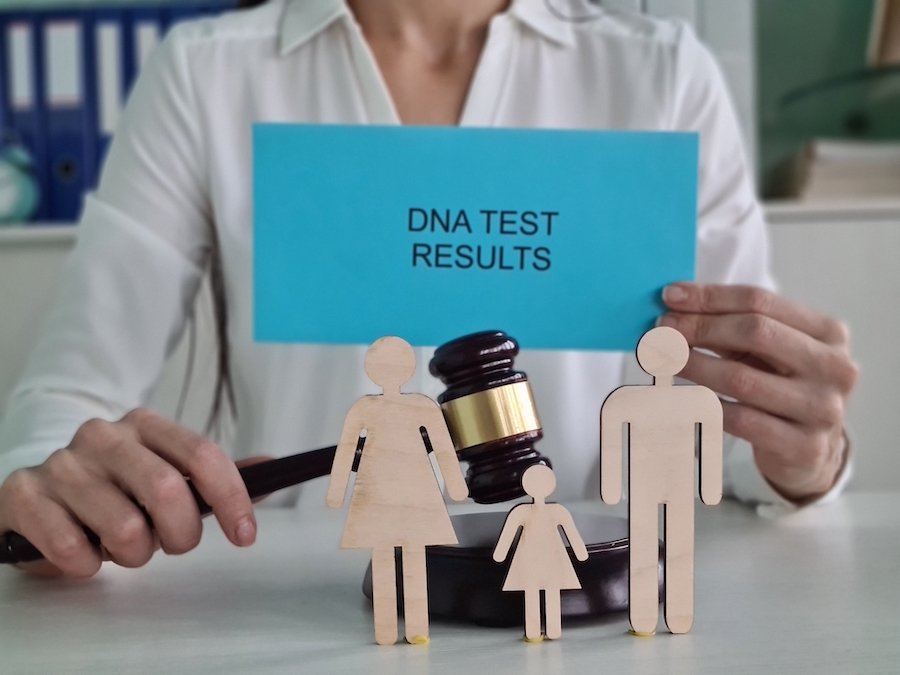Under NRS § 201.085, taking a fraudulent paternity test – or helping someone else take it – is a gross misdemeanor in Nevada carrying up to 364 days in jail and/or $2,000 in fines. Also, you face consequences in Family Court such as an order to pay child support.
Our Las Vegas criminal defense lawyers understand the delicate nature of paternity cases, and our goal is to try to keep your domestic life undisturbed. We have decades of combined experience in negotiating charges down to lesser offenses or full dismissals.
In this article, our Las Vegas criminal defense attorneys discuss the following paternity fraud topics:
- 1. Elements of the Crime
- 2. Defenses
- 3. Penalties
- 4. Record Seals
- 5. Failing to Pay Child Support
- 6. Additional Reading
1. Elements of the Crime
The Nevada crime of paternity fraud under NRS 201.085 is knowingly rendering inaccurate results of a paternity test. Paternity fraud may occur in one of two ways:
- By conspiring to have the wrong person take the DNA test; or
- By otherwise falsifying or forging the test results.
The biological father is not the only person who may be prosecuted for paternity fraud: Any person who knowingly takes the test in his place is equally liable.
Furthermore, anyone else who helps someone commit paternity fraud – or who doctors the testing equipment or results – faces criminal prosecution as well.1
2. Defenses
In our experience, the most effective defense to paternity fraud charges is that you had no intent to defraud. Prosecutors have no way of getting inside of your head, so it may be difficult for them to prove beyond a reasonable doubt that you meant to deceive anyone.
For example, perhaps you gave incorrect identifying information to your phlebotomist by mistake because you were preoccupied or nervous. Accidents are not crimes, and you should not be convicted as long as you lacked criminal intent.

Violating NRS 201.085 is a gross misdemeanor.
3. Penalties
Paternity fraud is a gross misdemeanor in Nevada. The sentence carries:
- up to 364 days in jail, and/or
- up to $2,000 in fines.2
Note that a conviction may rope you into Family Court as well. The judge may impose fines and child support payments. For further discussion, please see our article on paternity lawsuits in Nevada.
4. Record Seals
Gross misdemeanor convictions can be sealed from your record two year after the case closes. Though if your charge gets dismissed, you can petition for a record seal immediately.3
5. Failing to Pay Child Support
If paternity is established, you may be ordered to pay child support. Knowingly failing to provide child support is a Nevada crime under NRS 201.020.4
The punishment turns on whether you have past convictions and the amount in arrears, as this table shows:
| NRS 201.020 crime | Penalties |
| First violation (if you owe less than $10,000); or
Subsequent violation (if you owe less than $5,000) |
Misdemeanor: Up to 6 months in jail and/or $1,000 |
| First violation (if you owe $10,000 or more); or
Subsequent violation (if you owe $5,000 or more) |
Category C felony: 1 – 5 years in prison and up to $10,000 |
Additional Reading
For more in-depth information, refer to the following scholarly articles:
- When Daddy Doesn’t Want to Be Daddy Anymore: An Argument against Paternity Fraud Claims – Yale Journal of Law & Feminism.
- The Innocent Third Party: Victims of Paternity Fraud – Family Law Quarterly.
- Who’s the father? Rethinking the moral ‘crime’ of ‘paternity fraud’ – Women’s Studies International Forum.
- Little White Lies That Destroy Children’s Lives – Recreating Paternity Fraud Laws to Protect Children’s Interests – Journal of Law & Family Studies.
- The Plight of Putative Father: Public Policy v. Paternity Fraud – West Virginia Law Review.
If your family is being affected by paternity fraud, go to the organization PaternityFraud.com for help and resources.
Legal References
- NRS 201.085. Definition; penalty:
1. A person is guilty of paternity fraud if the person:
(a) Is ordered by a court to submit, or agrees to submit, to a test for genetic identification to determine the paternity of a child and knowingly assists, aids, abets, solicits or conspires with another person to have someone other than himself submit to the test for the purpose of preventing a determination that he is the father of the child;
(b) Submits to a test for genetic identification to determine the paternity of a child in place of the person who has been ordered to submit, or who has agreed to submit, to a test for genetic identification to determine the paternity of a child for the purpose of preventing a determination that the person for whom he is taking the test is the father of the child; or
(c) Knowingly assists, aids, abets, solicits or conspires with another person:
(1) To commit a violation of paragraph (a) or (b); or
(2) To render inaccurate the results of a test for genetic identification to determine the paternity of a child.2. A person who violates this section is guilty of a gross misdemeanor.
- Same.
- NRS 179.245. NRS 179.255.
- NRS 201.020.

